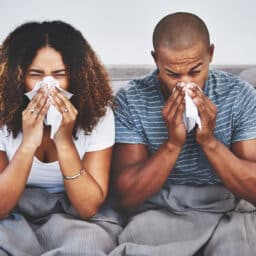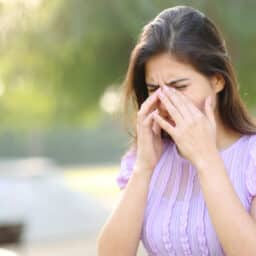Allergies vs. Common Cold: How to Tell the Difference

Cold season is just starting, and if you’ve been experiencing symptoms like a runny nose and congestion, you may be wondering if your symptoms are due to allergies or the common cold. To treat the condition, you need to know which it is, so let’s discuss the main differences. What Is a Cold? The common…
Can Allergies Cause Headaches?

You may not realize that there’s a strong link between allergic reactions and headaches. Often, allergies are associated with sinus- and throat-related symptoms, but our sinuses and throats are intimately connected with our faces and heads. How Can Allergies Cause Headaches? Allergic reactions cause inflammation and swelling, particularly in the nasal passages. This swelling builds…
Why Do Adult Allergies Happen?

Even though most people develop allergies in childhood, there are many who develop new allergies well into adulthood. How Allergies Work Regardless of when you develop allergies, the mechanism is the same. Your body identifies a harmless substance (like pollen) as a threat and creates antibodies in response. The next time you come into contact…
Allergies Worse in the Morning? It Might Be Dust Mites

Do you wake up every morning with itchy eyes and a runny nose? If you’ve noticed that your allergy symptoms always seem worse in the morning, it may be due to an incredibly common culprit: dust mites. What are Dust Mites? Dust mites are microscopic pests. They are closely related to ticks and spiders and…
Can Allergies Affect Your Ears?

The Centers for Disease Control and Prevention (CDC) states that 25.7% of adults in the United States have seasonal allergies. While seasonal allergies, or hay fever, are most commonly associated with symptoms like nasal congestion, sneezing and itchy, watery eyes, sometimes allergies can affect your ears as well. Allergies and Ear Pain If you have…
Tips for Hiking With Allergies

Hiking is a popular way to get some exercise while enjoying the great outdoors. Unfortunately, the fresh outdoor air might not feel so welcoming for the approximately 25.7% of adults with a seasonal allergy. Hiking with pollen, mold and other plant life allergies can cause symptoms including sneezing, congestion, itchy nose, watery eyes and hives….
What To Know About Allergy Fatigue

More than 50 million people in the United States have an allergic reaction each year. While some may only experience the occasional sneezing fit, others live with constant symptoms, especially around allergy season. If you have been living with constant allergy symptoms, you are likely familiar with allergy fatigue—a feeling of exhaustion brought on by…
How Can Tracking Pollen Counts Help You Manage Your Allergies

Seasonal allergies, also known as hay fever or allergic rhinitis, affect more than 100 million people in the U.S. each year. Allergies occur when the body’s immune system overreacts to allergens such as pollen from trees, grasses and weeds. This overreaction can cause symptoms like sneezing, itching, nasal congestion and watery eyes, and can even…
How Can Mold Allergies Be Managed?

With summer ending and the leaves beginning to change color around Geitner Park, it’s easy to think that allergies will disappear until the next pollen season. While pollen allergies may disappear during winter, mold allergies stick around. An estimated 10% of people have a mold allergy, with 5% showing symptoms. Mold allergy symptoms are similar…
What to Expect From an Allergy Test

Allergies affect more than 100 million Americans a year. Allergies symptoms will vary from person to person and may include but are not limited to: Allergies occur when the immune system overreacts to a substance (allergen) it believes is harmful by releasing histamine. Histamine release results in one or more of the allergy symptoms listed…